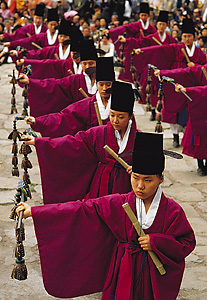Confucianism is a philosophy based on the ideas of the Chinese philosopher Confucius, who lived from about 551 to 479 B.C. However, some central ideas and values of Confucianism had begun taking shape by the time of the Western Zhou dynasty in China. This dynasty (family of leaders) ruled in China from 1045 to 771 B.C. From the time of Confucius to the A.D. 1900’s, Confucianism was the most important force in Chinese culture. It influenced art, education, government, literature, personal behavior, and philosophy.

Many people consider Confucianism a religion. Although Confucianism has religious elements, such as certain rituals, Confucianism has no clergy and does not teach the worship of a God or gods. Confucianism is more accurately a philosophy that focuses especially on questions about right and wrong.
Early Confucianism.
In the 500’s B.C., when Confucius lived, warfare raged among the many states that made up China. Rapid political change altered the structure of Chinese society, and many people no longer respected the traditional standards of social behavior. Confucius feared that this threat to orderly social relationships would lead to the destruction of civilization.
Confucius believed that society could be saved if it emphasized moral self-cultivation in personal and public conduct. Moral self-cultivation is demonstrated by the actions of the junzi, meaning superior person. Confucius did not define the junzi as an individual of noble birth, but rather as someone with good moral character.
Junzi possessed many virtues. They respected their parents. They worked for the good of their family, community, and society. Junzi were dedicated to learning. Junzi practiced self-examination to become better. They were guided by traditional rituals and social customs. Confucius included many of these rituals and social customs in his teachings. Confucius also taught a version of the golden rule, the principle that people should treat others as they would like to be treated themselves.
Confucius’s students all were men, because of the culture he lived in. But some scholars think Confucius may have believed that women also could become junzi. Confucianism generally focuses on the moral development of all people, including women and children.
Confucius believed that when junzi were rulers, their example would inspire those beneath them to lead good lives. Virtuous behavior by rulers, he declared, had a greater effect in governing than did laws and codes of punishment.
After Confucius died, his followers spread his ideas. The most important early Confucian philosophers were Mencius (391-308 B.C.) and Xunzi (mid-200’s B.C.). Mencius believed that people were born with good tendencies. He stressed the need to preserve and develop “the natural compassion of the heart” that made people human. Mencius emphasized the past as an ideal time and a model for examining present problems.
In contrast, Xunzi believed that people were born without any natural tendency to become good. He thought that they could become good and live together peacefully only if they were reshaped by the right rituals, teachers, and traditions.
The first large, unified Chinese Empire began in 221 B.C. Its rulers approved of Confucianism’s emphasis on public service and respect for authority. In 124 B.C., the government established the Imperial University to educate future government officials in Confucian ideals. The university based its teachings on five books of Confucian thought called the Five Classics. Mastery of the Five Classics became proof of moral fitness.
Later Confucianism.
The early Confucians concerned themselves primarily with the needs of society. However, ideas from Taoism (also spelled Daoism) and other philosophies helped shift the emphasis to additional areas of human experience. For example, a person’s ability to live in harmony with nature was a minor issue to Confucius. But it became a more important theme in later Confucian thought.
From about A.D. 200 to 600, interest in Confucianism declined in China. Many Chinese turned instead to Buddhism and Taoism. A revival of interest in Confucian philosophy began in the 600’s. By the 700’s, candidates for government jobs had to take a civil service examination based on Confucian ideas. The examination carried out Confucius’s belief that an enduring state must be built on the virtue of the advisers who counseled its rulers.
The philosopher Zhu Xi (1130-1200) became a leader of a movement called Neo-Confucianism. Zhu developed a branch of Neo-Confucianism that emphasized the study of Li and Qi. Li is the underlying patterns and processes of the world. Qi is the “energy” of which the world was made. Another influential Neo-Confucian was Wang Yangming (1472-1529). He argued that people were born with a moral mind that could guide them in understanding things and making decisions.
Confucianism has influenced Chinese life throughout Chinese history. Although the Chinese Communist government opposed Confucianism in the 1900’s, this official opposition ended in 1977. Today, Confucianism remains an important part of Chinese and other East Asian cultures.
